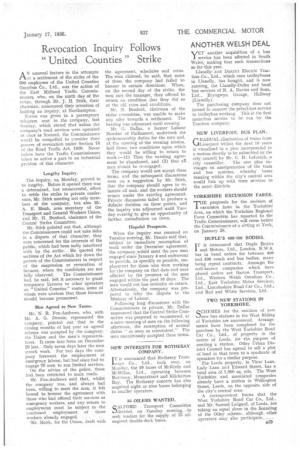Revocation Inquiry Follows "United Counties" Strike
Page 53

If you've noticed an error in this article please click here to report it so we can fix it.
AN unusual feature in the attempts at a settlement of the strike of the 500 employees of the United Counties Omnibus Co., Ltd., was the action of the East Midland Traffic Commissioners, who, on the ninth day of the strike, through Mr. J. H. Stirk, their chairman, announced their intention of holding an inquiry, at Northampton.
Notice was given in a peremptory telegram sent to the company, last Sunday, which stated that unless the company's road services were operated at once as licensed, the Commissioners would be compelled to consider their powers of revocation under Section 74 of the Road Traffic Act, 1930. Never before have the Traffic Commissioners taken so active a part in an industrial problem of this character.
Lengthy Inquiry.
The inquiry, on Monday, proved to be lengthy. Before it opened there was a determined, but unsuccessful, effort to settle the strike in private conference, Mr. Stirk meeting not only members of the company, but also Mr. A. E. Monk, area secretary of the Transport and General Workers Union, and Mr. H. Benford, chairman of the Central Strike Committee.
Mr. Stirk pointed out that, although the Commissioners could not take sides in a dispute of that character, they were concerned for the interests of the public, which had been sadly interfered with by the strike. He quoted the sections of the Act which lay down the powers of the Commissioners in respect of the suspension or revocation of licences, where the conditions are not fully observed. The Commissioners had, he said, felt it necessary to grant temporary licences to other operators on "United Counties" routes, some of whom were anxious that those licences should become permanent.
Men Agreed to New Terms.
Mr. N. R. Fox-Andrews, who, with Mr. A. G. Dennis, represented the company, pointed out that in the closing months of last year an agreed scheme was accepted by the company. the Union and the men's representatives. It came into force on December 1.1) last. Only seven days later the men struck work. For two days the company forewent the employment of emergency labour, but had since had to engage 70 men to run limited services.
the advice of the police, these had been restricted to main roads.
Mr. FoxsAndrews said that, whilst the company was, and always had been, willing to meet the men, it felt bound to honour the agreement with those who had offered their services as emergency workers, and any return to employment must be subject to the continued employment of those
workers already engaged. .
-Mr. Monk, for the Union, dealt with
the agreement, schedules and rotas. The men claimed, he said, that some of these the company had failed to honour in certain directions. When, on the second day of the strike, the men met the manager, they offered to return on condition that they did so at the old rates and conditions.
Mr. N. Benford, chairman of the strike committee, was unable to make any offer towards a settlement. The hearing was adjourned until evening.
Mr. G. Dallas, a former Labour Member of Parliament, undertook the spokesmanship duties for the men and, at the opening of the evening session, laid down two conditions upon which they would be willing to return to work :—(1) That the existing agreement be abandoned, and (2) that all men should be re-engaged.
The company would not accept these terms, and the subsequent discussions were on a suggestion by Mr. Stirk, that the company should agree to reinstate all men, and the workers should return, under the existing agreement. Private discussions failed to produce a definite decision on these points, and the inquiry was adjourned until Tuesday evening to give an opportunity of further consultation on them.
Hopeful Prospects.
When the inquiry was resumed on Tuesday evening, Mr. Dennis said that, subject to immediate resumption of work under the December agreement, the company would meet the new men engaged since January 4 and endeavour to provide, as speedily as possible, employment for those who were working for the company on that date and were affected by the presence of the men engaged within the past 10 days. The men would not lose seniority on return. Alternatively, the company was prepared to refer the dispute to the Ministry of Labour.
Following long discussions with the Commissioners in private, Mr. Dallas announced that the Central Strike Committee was prepared to recommend, at a mass meeting of men on the following afternoon, the resumption of normal duties " so soon as convenient." The men unanimously accepted these terms.




























































































